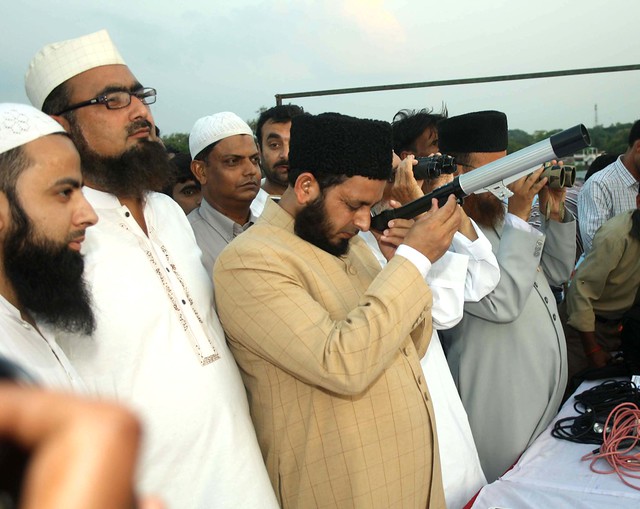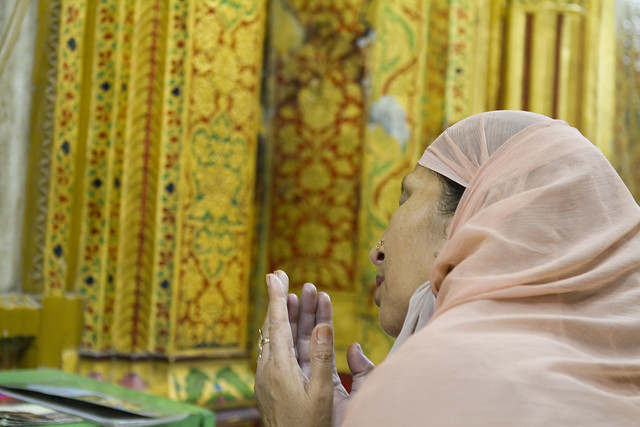Ramadan fast starts Saturday in India, except for those who start on Sunday
By Kashif-ul-Huda, TwoCircles.net
The Islamic principle seems to be simple enough – look for the new moon but if you cannot see it then assume previous month to be of 30 days- but Muslims have managed to make it a complicated affair.
It was half-past midnight that news came that Mumbai Hilal Committee headed by Mufti Azizur Rahman decided that moonsighting can not be confirmed and hence Shaban will be for 30 days and hence first Ramadan fast will be on Sunday July 22nd. Delay in announcing the decision led many Muslims up at night on Friday wondering if they are going to be fasting next day.

Khalid Rashid Firangi Mahali using modern equipment to sight the moon but he will not accept calculations.
Earlier in the evening, in Lucknow, Shia Chand Committee’s president Maulana Saif Abbas Naqvi announced that moon was not sighted and hence fasting will be on Sunday. Markazi Chand Committee of Firangi Mahal, Lucknow also announced around 9pm that there are no reports of moon sighting anywhere and hence first fasting will be on Sunday. But two hours later they changed their decision and announced that they have received repots of sighting in different parts of country and hence Ramadan begins sundown on Friday and first fasting day will be Saturday.
It is not clear who saw the crescent of Ramdan and where but it seems that first day of Ramadan is Saturday for most of Indian Muslims. Reports of Saturday fasting came from Kerala, Karnataka, Andhra Pradesh, MP, Bihar, UP, Delhi, Jharkhand, Tamil Nadu, Maharashtra. Those that are not starting their fast on Saturday are: Idara-e-Shariah of Bihar; Hilal Committee of Mumbai; Mufi Mukarram of Fatehpuri Masjid, Delhi, Shias in Hyderabad.
Late last night young Indian Muslims turned to the internet –mostly facebook & twitter- to find out the latest information. Masjids in many towns used their public-address system to announce the beginning of Ramadan, in many cases announcements were made way past midnight.
Confusion about different dates of Ramadan and Eid in the same city causes much tension among Muslims. Prompting Mumbai-resident Suhaill Kazi to ask the question on twitter, “What to do? Keep extra roza or go w/local? I hate this. Every single yr we have some grp not accepting other’s witness.”
There has been attempt to use calculation and calendars to remove uncertainties about confusion over moon-sighting. This year, Vice-President of All India Muslim Personal Law Board and prominent Shia Cleric, Dr Kalbe Sadiq made the announcement on July 16th about the beginning and end of Ramadan. He had announced that first Roza will be Saturday, July 21st and Eid-ul-Fitr will be celebrated on 20th of August.
Sadiq has championed using modern methods for few years now. Three years ago he said, “today, when science has progressed so much, the least we could do is to rely on astronomical facts and confirm the date of the new moon well in advance; that would leave no scope for the confusion that is often created on account of the actual visibility in one city and non-sighting in another.”
A group of Muslim scientists in Kerala are trying to bring more science into the making of Islamic calendar. Based in Kozhikode, Hijra Committee of India is building the scientific argument for an Islamic calendar based on astronomical sciences.

A woman raises her hands in prayers at Hazrat Nizamuddin Dargah in New Delhi on the eve of the first day of Ramadan 1433. [Photo by Natisha Mallick for TwoCircles.net]
Talking to TwoCircles.net in May, Abdul Shukoor T of Hijra Committee says: “One can’t see hilal on the new moon day as the hilal is visible before the naked eyes only after sun sets in the west on the first day of a lunar month. So it is like the ones who are firm on their decision that they will start a new month only after seeing the hilal will go wrong as they will start counting the second day of the lunar month as first because they baselessly consider the setting stage of the first day moon as a rising one, hoping that the next day is the first of a lunar month whereas scientifically too the fact is that it is impossible to see new moon on the night prior to the first day”.
He called it “illogical” to go look for crescent (hilal) one day a month, instead a more scientific approach will be to observe the phases of the moon on a regular basis. Hijra Committee also challenge organizations that claim to view the hilal when it is scientifically impossible to see it.
As the frustration grows over delay in announcements and disagreement between different Muslim organizations, many will turn to more scientifically generated Islamic calendar to plan their start and end of Ramadan. But ulema presiding over hilal committees hold the trump card as they run the masjids that organizes the tarawih (night prayers) and Eid prayers forcing everyone to follow their announcements, even if it doesn’t make sense.
Links:
http://www.hijracalendar.com/
http://twocircles.net/Special%20Reports/ramadan_1433.html

